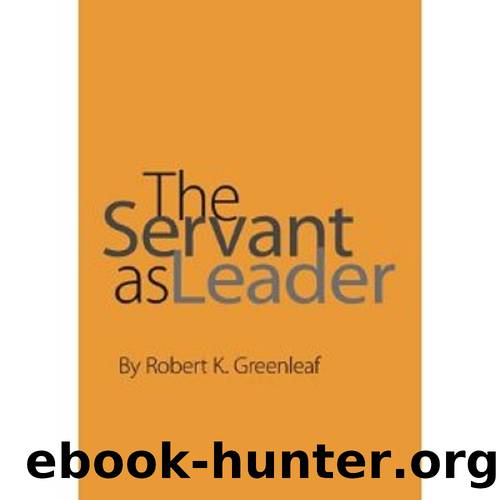The Servant as Leader by Robert Greenleaf

Author:Robert Greenleaf [Greenleaf, Robert]
Language: eng
Format: epub
Tags: The Servant as Leader
Publisher: The Greenleaf Center for Servant Leadership
Published: 2012-07-09T22:00:00+00:00
One Action at a TimeâThe Way Some Great Things Get Done
Two things about Thomas Jefferson are of special interest here. First as a young man he had the good fortune to find a mentor, George Wythe, a Williamsburg lawyer whose original house still stands in the restored village. George Wythe was a substantial man of his times, a signer of the Declaration of Independence and a member of the Constitutional Convention. But his chief claim to fame is as Thomas Jeffersonâs mentor. It was probably the influence of mentor on understudy, as Jefferson studied law in Wytheâs office, that moved Jefferson toward his place in history and somewhat away from his natural disposition to settle down at Monticello as an eccentric Virginia scholar (which he remained, partly, despite Wytheâs influence). The point of mentioning George Wythe is that old people may have a part to play in helping the potential servantas-leader to emerge at his optimal best.
Perhaps the most significant aspect of Jefferson, more important in history than the Declaration of Independence or his later term as President, was what he did during the war. With the publication of the Declaration the war was on and Jefferson was famous. He was importuned on all sides to take important roles in the war. But he turned them all down. He knew who he was and he was resolved to be his own man. He chose his own role. He went back to Virginia and didnât leave the state for the duration of the war.
Jefferson believed the war would be won by the Colonies, that there would be a new nation, and that that nation would need a new system of law to set it on the course that he had dreamed for it in the Declaration of Independence. So he went back to Monticello, got himself elected to the Virginia legislature, and proceeded to write new statutes embodying the new principles of law for the new nation. He set out, against the determined opposition of his conservative colleagues, to get these enacted into Virginia law. It was an uphill fight. He would go to Williamsburg and wrestle with his colleagues until he was slowed to a halt. Then he would get on his horse and ride back to Monticello to rekindle his spirit and write some more statutes. Armed with these he would return to Williamsburg and take another run at it. He wrote 150 statutes in that period and got 50 of them enacted into law, the most notable being separation of church and state. For many years Virginia legislators were digging into the remaining 100 as new urgent problems made their consideration advisable.
When the Constitution was drafted some years later Jefferson wasnât even around; he was in France as our Ambassador. He didnât have to be around. He had done his work and made his contribution in the statutes already operating in Virginia. Such are the wondrous ways in which leaders do their workâwhen they know who they are
Download
This site does not store any files on its server. We only index and link to content provided by other sites. Please contact the content providers to delete copyright contents if any and email us, we'll remove relevant links or contents immediately.
The 5 Love Languages: The Secret to Love That Lasts by Gary Chapman(8493)
The Space Between by Michelle L. Teichman(6086)
Assassin’s Fate by Robin Hobb(5236)
Wiseguy by Nicholas Pileggi(4585)
Everything Happens for a Reason by Kate Bowler(4067)
Gerald's Game by Stephen King(3918)
A Simplified Life by Emily Ley(3567)
The Power of Positive Thinking by Norman Vincent Peale(3447)
Pillow Thoughts by Courtney Peppernell(3395)
Resisting Happiness by Matthew Kelly(2886)
Girl, Wash Your Face by Rachel Hollis(2821)
Being Aware of Being Aware by Rupert Spira(2706)
Name Book, The: Over 10,000 Names--Their Meanings, Origins, and Spiritual Significance by Astoria Dorothy(2490)
Real Sex by Lauren F. Winner(2474)
More Language of Letting Go: 366 New Daily Meditations by Melody Beattie(2442)
The Holy Spirit by Billy Graham(2414)
Fast Facts on Defending Your Faith by John Ankerberg & John Weldon(2388)
Victory over the Darkness by Neil T. Anderson(2385)
The Secret Power of Speaking God's Word by Joyce Meyer(2252)
